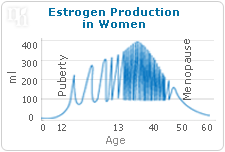
Menopause is defined as the moment when a woman has had no menstrual periods for 12 consecutive months. While menopause is known to give women problems with their hormones, often women experience more hormonal symptoms during the years before menopause. As the body prepares to shut down reproductive functions, estrogen and progesterone production is thrown out of order. This stage is called perimenopause. The symptoms known to accompany hormone changes can range from very light symptoms to debilitating ones.
Keep reading to find out more about perimenopausal hormone levels.
What Are the Symptoms of Perimenopause?
Perimenopausal hormone levels can fluctuate wildly compared even to menstrual fluctuations or menopausal fluctuations. This is why women experience more frequent and intense symptoms during perimenopause than during premenstrual, pregnancy, menopause, or after menopause. Here is a list of some of the most common symptoms associated with perimenopause:

- Hot flashes
- Night sweats
- Vaginal dryness
- Irregular periods
- Mood swings
- Loss of libido
- Headaches
- Sleeping problems
- Difficulty concentrating
- Memory problems
- Uterine bleeding
Keep reading for more information and learn more about treatments for perimenopausal hormone levels.
Treatments for Perimenopausal Hormone Levels
There a number of treatments available for women who are suffering from perimenopausal symptoms due to fluctuations in hormone levels. One of the most popular treatments for menopausal women is hormone replacement therapy (HRT). This introduces estrogen and small amounts of progesterone into the body to halt perimenopause symptoms. This treatment can often help women find her hormonal balance, but the treatment may cause a higher risk of developing more serious conditions, such as breast and uterine cancers, or a stroke. It is important to consult a doctor about the health risks if you are thinking about taking hormone replacement therapy.
Some menopausal women believe that the health risks outweigh the benefits to taking hormone replacement therapy. Instead, they work to combat perimenopause symptoms via a combination of exercise and a healthy diet. These will help you find a balance and allow your body to deal with perimenopausal hormone levels naturally.
Finally, there are some alternative medicines that have helped women with the symptoms of perimenopausal hormone levels. Aromatherapy, teas, and herbal supplements have been very helpful in combating perimenopausal symptoms, and come with little or no side effects even can be used alongside medications.
Click on this link for more information on treatments for perimenopausal hormone levels.
